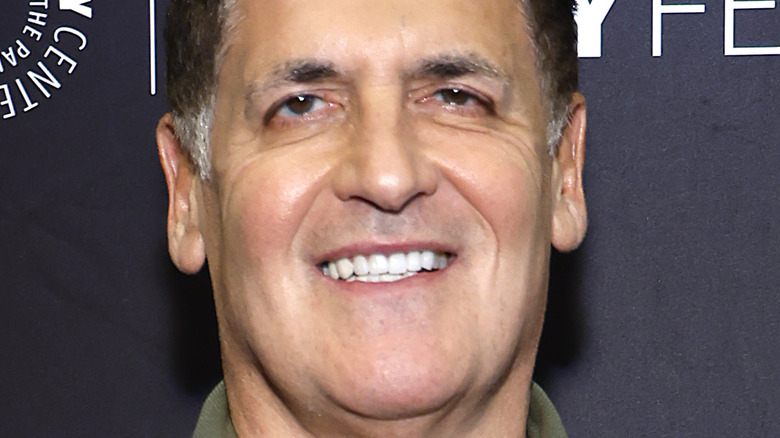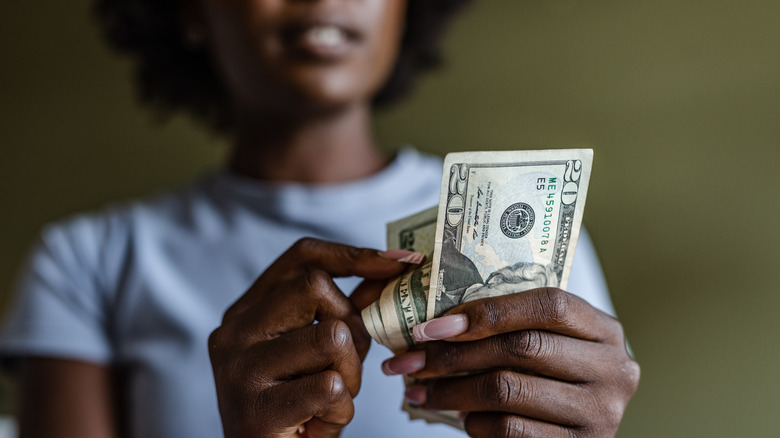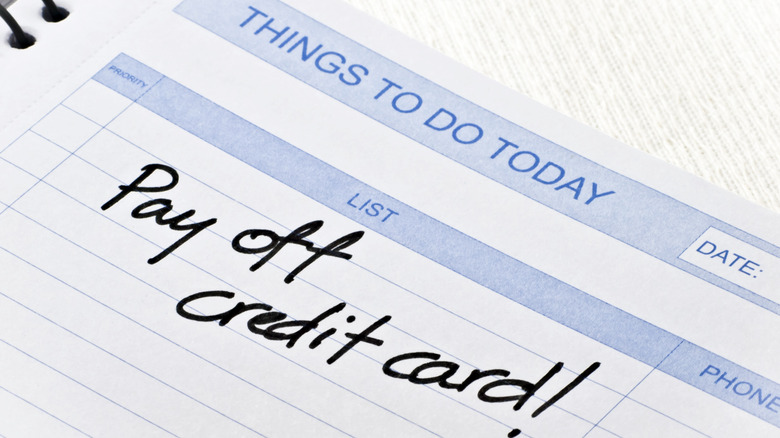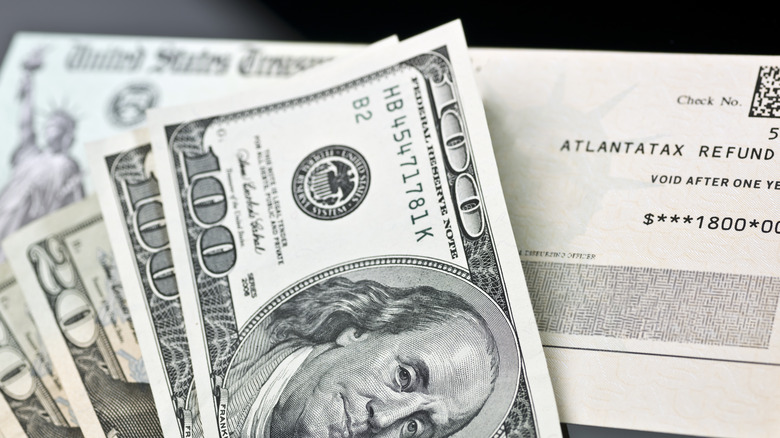Mark Cuban's Best Tips And Tricks For Managing Your Money
Mark Cuban famously touts the idea that anyone can become a millionaire and live out their dreams of riches and luxury. The entrepreneur has worked tirelessly to build his financial empire from the time he was just a kid. As a 12-year-old, Cuban resold boxes of garbage bags purchased from his father's friend. "The world's first, probably only, garbage bag door-to-door subscription company," Cuban said of his first business venture. Later on, he would sell his startup Broadcast.com to Yahoo! For $5.7 billion.
Today, Cuban is a fixture on the investment program "Shark Tank," owns the Dallas Mavericks, and in 2022 launched an online pharmacy, Cost Plus Drugs that stocks over 1,000 generic drugs at cost, plus a small, entirely transparent markup. Cuban is also vocal about his thoughts on strategies for building increasingly stable financial foundations. He believes that anyone can develop the kinds of riches that they desire, focusing on the discipline required to achieve financial literacy and a strong savings profile. Mark Cuban's advice is often straightforward and can be implemented without too much difficulty. These are some of his most valuable tips and tricks for managing your money and financial future.
Spend on your future, not your present
Mark Cuban's success began early in the entrepreneur's life. He was selling trash bags as a 12-year-old and got into the stamp trading game around age 16. He was constantly hustling to get ahead in the next venture, even in his youth. That drive to succeed, for Cuban, was coupled with a long vision of what his future might hold. Cuban advocates for investments made in things that will enrich your future rather than your present. He says that savers and investors looking to take better control of their finances should skip those expensive lunches, drive an inexpensive car, and pay as little as possible on rent and other essential spending categories.
If you're looking to build your own business, in particular, living frugally today can create the essential financial overhead space required to launch your future successes. Mark Cuban isn't exactly advocating for the standard "cut out that morning trip to Starbucks" advice. Instead, his personal experience in living frugally was aimed at larger expenditures, as well as a holistic take on finances more broadly. Instead of trying to find one little thing to excise from your budget, look for big-ticket items first and then expand your view to encompass the entirety of your budget. As one concrete example, the average American spends $348 per year on unused subscriptions. Simply stemming these leaks in your budget will open up a wealth of new possibilities.
Leverage your money to buy time
Mark Cuban's approach to money management often revolves around frugality. However, there's one aspect of his strategy that's held in even higher esteem. Cuban believes in streamlining within his lifestyle, and prioritizes his time above his financial goals. He told his "Shark Tank" costar Barbara Corcoran on her podcast, "I value my time a lot more than my next dollar."
Cuban's $5 billion net worth has translated into time-saving purchases like a private jet. Flying in his own plane makes for faster transit while he's on the go, saving critical hours that might otherwise be spent waiting around for layovers or working through security lines. A private plane won't be on many people's shopping lists, but certain strategic purchases that can save time don't have to be relegated only to the realm of the super-rich. Saving up to buy a car rather than relying on public transportation, for instance, can save you tons of time while you're out and about or engaged in your daily work commute. Other, smaller purchases can also act as quality time savers. Buying frozen, bagged vegetables can save you time chopping ingredients while you're piecing together your dinner each night. Sticking with travel time savers akin to Cuban's approach, programs like TSA PreCheck and Global Entry, can make for streamlined transit that gets you through the line swiftly and recaptures some of your time.
If using a credit card, only spend what you can pay back immediately
Like many other billionaires, Mark Cuban isn't a big fan of loans, credit card usage, and other debt creators. Of course, it's easy to ditch the use of borrowed capital when you're incredibly wealthy, but the sentiment isn't just born of the entrepreneur's immense financial resources. Cuban, among others, sees the detrimental effects that credit usage can bring into the life of a consumer and saver. If you don't manage your credit cards wisely, you're liable to experience a continually slipping financial picture that gets bleaker over time rather than stronger.
Credit cards, in particular, sport some of the highest interest rates you'll find anywhere in the financial marketplace. The result is the ability for a simple purchase to snowball into an extremely expensive overall cost. Cuban's advice is to shy away from credit cards, but if you are going to use one, treat it as if it were cash. One way to accomplish this is to pay down every purchase you make with your card right after it posts. This can be a valuable strategy as you traverse the world of cash-back or travel rewards credit cards. However you go about strategizing for your credit usage, maintaining a budgetary equilibrium in which you're always spending less than you're bringing in remains the central goal.
Consider community college in your first year or two
Mark Cuban has also taken aim at the institution of higher education. For most undergraduate students, the first two years of college are typically dominated by prerequisite courses and general education requirements (math, science, and writing coursework, in particular). While there are plenty of options that will appeal to a range of students' interests among the courses that satisfy these requirements, they can sometimes feel like a continuation of high school's semi-rigid course structure.
Instead of paying out the nose to take some of the same kinds of classes, Cuban suggests enrolling in community college for at least the first year of university-level schooling. Community colleges provide the same high standard of teaching and offer a wide range of course options as well. Yet, community colleges charge far less than four-year universities and students may even live near one, allowing them to slash some of the lifestyle expenses that come along with college life, too. Moving on to a four-year university to finish out your studies after the first or second year in which you tackle many of the prerequisites can help you save considerably as you make your way through higher education and give you a smoother transition into the responsibilities and increased workload of collegiate learning.
Try negotiating with cash
While limiting credit card usage is a common theme among wealthy investors and entrepreneurs, Mark Cuban also considers debit card spending to be a potentially fraught habit. His reasoning is that cash carries an inherent negotiating opportunity that isn't present when you pull out plastic from your wallet. Cuban is always shopping around for bargains and deals, and using cash can facilitate this in many situations that you may never have thought about. In particular, paying for services makes for a great opportunity to work on your negotiating skills. If you want to take a yoga or pottery class in your local community, for instance, showing up with cash allows you to ask for a discount naturally. If the class costs $20 and you arrive with $15 you'll naturally create a situation in which the service provider will either accept that reduced payment or not. It's a binary choice, but one that Cuban suggests will work in your favor more often than not (most people would rather take the 15 bucks than nothing at all, he reasons).
Of course, it's important to use this technique sparingly. Asking for discounts is valuable because anxiety over this kind of conversation prevents many people from saving money on the things they need and want. However, if you're dealing with community business owners you may not want to always try to haggle your way into discounts in the same way that you might with a more corporate service provider.
Invest in books
Reading is a common habit among the world's wealthiest individuals, and Mark Cuban is no exception. He considers books to be an excellent teaching opportunity, with each new title ready to impart some novel information that can help you succeed in a wide variety of future endeavors. Reading is a proven method for expanding your mental horizon. The more you read, the more you think about the world around you. This is true for fiction and nonfiction alike. When reading fictional tales, readers begin to genuinely empathize with the characters that populate the stories, providing a greater perspective on many of the common features and troubles that translate into everyday life. In nonfiction pages, readers gain a deeper understanding of something that's a part of the physical world around them. Whether focused on historical or modern subjects, taking in new knowledge is a great way to bring about fresh takes on the typical situations you may experience in your own life. In business, investments, and routine daily tasks, the more you read the better you're able to think through new challenges.
Think twice about bank loans
It won't always be possible to avoid, but taking out a loan to purchase something big and important will dilute your ownership of the thing in a major way. When buying a home or car through financing opportunities, this translates into a larger personal expense. But if you're talking about a real estate investment or business purchase, it can cut into your profits or even alter the way you approach a new opportunity in the space.
Mark Cuban is a big proponent of limiting your exposure to external financial obligations, specifically the repayment of loans. It's easy to shirk lending options for financing important spending needs when you're a billionaire, of course, but the lesson remains an important one for anyone thinking of making a big purchase in the future. The less you can borrow, the more ownership you'll be able to enjoy of the thing in question. If you're buying into a business, for instance, a monthly loan repayment can hamstring your ability to focus on the growth of the enterprise. Instead of tackling big-picture action items that might represent your priorities, you'll immediately need to figure out how to make enough money to cover the repayments. Similarly, if you purchase a home to flip, you'll be paying back the bank every month that you own the property, cutting into available cash for renovations and putting a stress-inducing clock on the project overall.
Consider savings in a few general buckets
Mark Cuban, among virtually all other financial advice-givers, suggests saving for retirement, building emergency savings, and prioritizing other cash-building tasks. However, Cuban thinks in 'buckets,' so to speak. "If you aren't saving for retirement, you are saving for the moment you need cash... Buy and hold is a sucker's game for you," he offers. In your savings pools that aren't focused on retirement, utilizing a different savings strategy is key to getting the most out of your financial heft.
In addition to retirement savings and emergency cash, if you aren't saving for something in particular (perhaps a new home or a set of jet skis) short-term savings tools are the best option for your ongoing efforts to set cash aside. In reality, this reserve of cash is savings for whatever you might need cash to purchase. You might decide to install a new garden area in your backyard or purchase a new set of golf clubs for the upcoming start of the season. These kinds of purchases benefit from short-term CDs, interest-bearing savings accounts, and other short-term savings vehicles that won't introduce head-spinning complications come tax time or limit your ability to sell in a reeling market. Cuban's suggestion here really boils down to a savings option that's easy to pay into and equally simple to withdraw funds from when the need arises.
Buy in bulk
Buying in bulk is great advice for anyone hoping to save a few bucks anytime they head out to the store. There are dozens of products that you'll buy repeatedly throughout your lifetime. Disposable items like sponges, consumables like bars of soap and deodorant, and food products like meat, canned tomatoes, and spices all form huge segments of repeated purchases on grocery lists.
Mark Cuban suggests buying these kinds of things in bulk whenever possible. Bulk buying results in lower prices per item, almost as an unflappable rule across the board. Buying larger packages of goods will cost more in the short term, but the savings you rake in over time can really add up. Studies suggest that bulk buying can save as much as 35% over routine spending on a wide range of products. Everyone will have their own budgetary and storage restrictions, but distilling the advice down into its simplest format is something that everyone can do, regardless of these external factors. The ingrained lesson here is that rather than looking only at the retail price of a bag of potatoes or pack of socks, look to calculate the price per pound or price per unit so that you can work out the best value size that still fits your budget.
Always prioritize paying off debt
While some entrepreneurs and wealthy investors suggest maintaining a focus on your savings targets at all times — even if it's a divided focus with other factors coming into the frame — Mark Cuban takes a different path. Cuban laments the incredibly high interest rates that dominate consumer borrowing products, with credit card rates coming in at an astronomically high cost. Even the most beneficial credit card rates are still far above that of a typical personal loan or mortgage product.
Cuban believes that saving while you're trying to eliminate debts spreads your focus too thin, and it doesn't properly address the root issue at the heart of your debt concerns. The negative interest accumulated on credit cards and (likely) most other major lending products you are working to pay down as quickly as possible is far greater than the positive interest you can expect to earn on your savings and investments. The result is a financial balance that skews negative. Instead of working to pile cash into your savings and investment accounts, focus on eliminating high-interest debts with all your attention, and then transition to a full-throated effort to build your investment portfolio.To Cuban, the result is an enriching one.
Don't splurge after a bonus or tax refund
Like many other wealthy entrepreneurs, Mark Cuban is firmly against the use of tax refunds and bonus checks as surplus spending money. For one thing, a tax refund check is just the government's way of paying you back for the interest-free loan you provided throughout the year. The money is yours, and not some kind of bonus infusion of capital.
Any time you get a big boost to your income, through a bonus check or your tax refund, you should treat the bulk (or perhaps all) of the money as a surge of funds that can help tick away at your savings goals or speed along the debt reduction efforts you're already working on. Putting all that cash toward credit card debts or piling it into your retirement account can go a long way to stabilizing your financial circumstances over the long term. A bonus check might be enough to completely pay off one of your cards, resulting in a minimum payment requirement that no longer hangs over your head each month. Similarly, your tax refund can make for a gigantic cash infusion to your savings efforts or retirement planning. Treating these types of oversized checks as a means to move closer to your financial goals rather than as a boost to your spending money is a phenomenal way to create better financial stewardship in all aspects of your life.
Embrace risk and uncertainty
Hard economic times make for a twofold opportunity. Investment assets are often devalued during market hardships. Whether you've got your eyes on FAANG stocks floating around the tech sector, or banking industry assets, troubled economic periods make for great buying opportunities. Purchasing assets when their prices are artificially deflated can make for gigantic returns on investment when the market inevitably rebounds. Buying at discounted rates is one of the most important things you can do as an investor. Mark Cuban and every other successful entrepreneur and investor constantly keeps an eye on the marketplace to find undervalued assets due for a rebound. You should too: This isn't a skill or strategy reserved for the ultra-wealthy.
Additionally, many investors and business hopefuls find themselves shocked into a state of inaction during these kinds of trading periods and uncertain financial times. Cuban suggests embracing the risk and uncertainty that comes with a fraught marketplace. Failure is always a possible outcome in business or investing, regardless of the marketplace conditions. Therefore, jumping on an investment opportunity shouldn't be tied to fair weather in the environment you're hoping to enter. Stormy seas often make for the best opportunities for those willing to bet on themselves. As others are trying to weather the storm or waiting for calmer conditions, you'll be carving out your place in the ecosystem and then doubling down on your position of strength while others are trying to establish a foothold later on.












